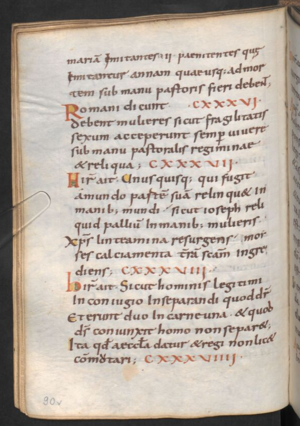Wien, ÖNB, Cod. 522
| Library | Österreichische Nationalbibliothek |
|---|---|
| Shelfmark | Cod. lat. 522 |
| Century | s. IX⅔ |
| Provenance | ? |
| General region of origin | Salzburg |
| Collection | Collectio CCL capitulorum |
| Collection 2 | Collectio CCCC capitulorum |
| Collection 3 | Collectio XXX capitulorum (De ratione matrimonii) |
| Author | Bruno Schalekamp |
| Author | Sven Meeder |
Wien, Österreichische Nationalbibliothek, Cod. lat. 522 is a middle ninth-century manuscript of 206 folios in 1 col. and 20-21 lines (235 x 160 mm (173-180 x 120 mm)). Its codicological composition is unknown and only a few inconsistent quire signatures were included: I8, I79, and XIII103, XIIII111, XV119, XVI127, and XXI167 – only the topside of the last three mentioned numerals are visible – in Roman numerals in black ink on verso sides. Modern foliation numbering in Arabic numerals and lead pencil. It was written by several hands in Caroline minuscule in saec. IX⅔ according to Kéry and Mordek, probably during the reign of archbishop Liuphram (836-859) according to Bischoff. Its older catalogue dated the manuscript to saec. X, which may be considered outdated. The manuscript's origin is from Salzburg according to the abovementioned authors, and more specifically St. Peter’s Abbey according to its online catalogue. It probably remained there in the Domkapitelbibliothek until 1806 when it was transferred to the Österreichische Nationalbibliothek.
Contents
The codex is a large-sized codex and contains mostly canonical material, dominated by both the Collectio CCL capitulorum and Collectio CCCC capitulorum. A few chapters of the Collectio XXX capitulorum (De ratione matrimonii) were incorporated in the former collection. The rest of the manuscript for the most part comprises either pope Gregory the Great's Concordia or Bede's De natura rerum and (a few chapters of) De ratione temporum. An (Irish) text on gospel meditation and an unknown work titled Uersus de conditore templi conclude the last added textual witnesses in the manuscript.

See the digitized version: https://digital.onb.ac.at/RepViewer/viewer.faces?doc=DTL_3320833&order=1&view=SINGLE.
| folios | texts |
|---|---|
| Front cover | |
| 1r | Blank page |
| 1v-2v | An ‘Irish’ interpretation of gospel meditation, according to Bischoff. Categorized as Scholastica de evangeliis in its catalogue. |
| 2v-3r | Uersus de conditore templi |
| 3r and 4r-29r | Bede's De natura rerum, a complete witness. Fol. 3v is a blank page |
| 29r-57r | Pope Gregory the Great's Concordia quorumdam testimoniorum sacrae Scripturae, a complete witness |
| 57r-113v | Collectio CCL capitulorum, including: |
| 90v-93v: Collectio XXX capitulorum (De ratione matrimonii), taken up into collection and untitled | |
| 113v-192v | Collectio CCCC capitulorum. Fols. 118v and 138v are blank pages |
| 192v-205r | Bede's De ratione temporum, chapters 67-71 |
| 205v-206v | Blank pages |
| Back cover |
Literature
Bischoff, ‘An Hiberno-Latin Introduction’ (1979), p. 234-236; Bischoff, Schreibschulen Vol. 2 (1980), p. 82 and 159-160; Fransen, ‘Trente-quatre questions sur Saint Paul’ (1963), p. 244-276; Kéry, Canonical Collections (1999), p. 77, 83, and 163; Kendall, Wallis, Bede On the Nature of Things (2010), p. 55 n. 135; Lhotsky, Quellenkunde (1963), p. 150; Mazal, ‘Die Salzburger Dom- und Klosterbibliothek’ (1997), p. 44-64; Meeder, 'Biblical past and canonical present: the case of the Collectio 400 capitulorum'; Mordek, Kirchenrecht und Reform (1975), p. 258-259; Reynolds, ‘Canon law collections’ (1980), p. 15-34; Reynolds, ‘Unity and Diversity’ (1983), p. 99-135; Tabulae Codicum (1864), p. 88-89; Unterkircher, ‘Die karolingischen Salzburger Einbände’ (1955), p. 41-53; Vezin, ‘Les plus anciennes reliures de cuir’ (1988), p. 391-408.
The edition of the Collectio CCCC capitulorum by Sven Meeder will soon be in print. Furthermore, an edition of the Collectio XXX capitulorum (De ratione matrimonii) is currently being prepared by Sven Meeder, Gideon de Jong, and Bruno Schalekamp.
